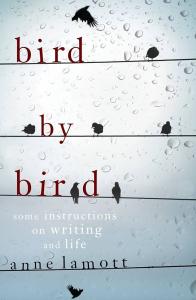The list of authors whose work has been most influential on my spiritual growth over the past couple of decades is lengthy (and almost exclusively female). The list non-exhaustively includes, in no particular order, Rachel Held Evans, Sarah Bessey, Barbara Taylor Bradford, Nadia Bolz-Weber, Marilynne Robinson, Sara Miles, Joan Chittister, Kate Bowler, Kathleen Norris . . . I’m sure I’m forgetting someone.
But the first and perhaps most impactful writer on my recent spiritual journey is undoubtedly Anne Lamott. Her twentieth book, Somehow: Thoughts on Love arrived two days ago and is at the top of my extensive summer reading list (along with new books by Bessey, Bowler, and Robinson). Her 2005 book Plan B: Further Thoughts on Faith is the first assigned text in my “Faith and Doubt” colloquium that I team-teach with a colleague and friend from political science who also happens to be a Dominican priest It is the follow-up to her 1999 Travelling Mercies: Some Thoughts on Faith which was the first Lamott book I read. we play her 2017 Ted talk in its entirely in our first class meeting.
I recall being blown away by her unflinching honesty and humor on disparate subjects like love, death, faith, parenthood, and writing. When a colleague told me at least a dozen years ago at a local watering hole one Friday afternoon that my experimental essays which ultimately turned into the early weeks of this blog reminded him of Anne Lamott’s writing, I immediately bought the next round. Suffice it to say that I love her work.
 Marking her 70th birthday and the release of her latest book, Lamott was the hour-long guest on last week’s “Ted Radio Hour” podcast. It begins with a story from her childhood that is the source of Lamott’s 1995 classic Bird by Bird, the best book on writing I have ever read. She recalls her brother who, in fourth grade, had a research paper on birds the next day that he had not started yet. Understandably, he was freaking out. Anne’s father sat down next to him, put his arm around his shoulder, and said “just take it bird by bird, buddy. Bird by bird.”
Marking her 70th birthday and the release of her latest book, Lamott was the hour-long guest on last week’s “Ted Radio Hour” podcast. It begins with a story from her childhood that is the source of Lamott’s 1995 classic Bird by Bird, the best book on writing I have ever read. She recalls her brother who, in fourth grade, had a research paper on birds the next day that he had not started yet. Understandably, he was freaking out. Anne’s father sat down next to him, put his arm around his shoulder, and said “just take it bird by bird, buddy. Bird by bird.”
She calls this the best writing advice she ever received, and she’s right. Writing is an incremental process that can be overwhelming if the writer tries to look at the “big picture” too often. Spending even a few minutes writing through a new idea or insight is always better than waiting until the big idea—which often doesn’t even exist yet—inspirationally strikes you. The majority of essays over the past twelve years in this blog have been the product of “bird by bird” activity than the recording of already formed thoughts.
I’ve been doing the bird by bird thing with one of my sabbatical books over the past two months. Published authors know that each book is, on some level, like one’s child—you want to believe that it is perfect, fully formed, and incapable of improvement. Until someone else reads it, that is. Of my five published books, all but one were rejected by at least two publishers before landing in the right place. The one exception is my most recent (2019) book; for that one, I was approached by a publishing house and asked to write on a particular theme—the book was under contract before I seriously began writing it. That’s the way it should always work . . . but it doesn’t.
As I’ve mentioned a few times over the past many weeks here, I currently have two book manuscripts under review, one by a possible publisher and the other by a possible literary agent. The first book, originally titled The Freelance Christian’s Guide to the Liturgical Year, was rejected (quickly) by the first two places I sent a proposal to. The first place sent me this email:
Thank you for submitting your manuscript proposal to us. After reviewing it, we have determined that it does not fit our publishing program.
A month later, the second publisher emailed me as follows (after spending all of a week considering the proposal carefully):
Thank you for submitting your proposal to _____ Press. Your proposal has been received, but I regret to inform you it is not a good fit for our program.
I think there must be an AI program that writes these rejections—they all have sounded so similar over the years.
The good news is that I got a strong bite a couple of weeks later from the third place I proposed my book to. Note: It’s generally considered to be in poor taste to send a proposal to more than one place at a time. I have always lived by that rule, although I have often wished I hadn’t. And here’s where commitment to “bird by bird” really helps.
- 2/9/24: I send my proposal to ________ publishing house, now with a new name: For Everything There Is a Season: An Outsider’s Journey Through the Liturgical Year.
- 3/1/24: A senior editor at the publishing house sends me a very encouraging lengthy email indicating not only strong interest in the project but also suggesting a new secondary title (A Guide to Spiritual Growth Through the Liturgical Year) and making clear that a contract offer would depend on some relatively significant revisions.
- 3/11/24: A very fruitful and enjoyable thirty minute Zoom conversation with the senior editor clarifying both what is attractive about the project and the sorts of revisions the editor has in mind.
- 3/13/24: I send a revised first chapter of the manuscript to the editor incorporating the proposed changes and revisions; editor promises by return email to share the project and revised chapter with other editors and acquisitions team.
- 3/27/24: The editor replies, apologizing for the delay (which is actually minimal compared to how these things usually go). Interest continues, but more work (hopefully last revision) is needed before contract offered—details of the nature of further needed revision is provided. Yet another title is proposed: Seasons of Change: Exploring Faith, Philosophy, and Spiritual Growth Through the Liturgical Year.
- 4/1/24: Thirty minute phone conversation with editor in order to be sure I am clear about the proposed revisions. Editor believes that with this second revision it is “highly likely” that a contract will be offered.
- 4/4/24: I send a newly revised first chapter to the editor incorporating proposed changes and revisions. By return email she promises it will be discussed at the next acquisitions and publishers meeting the following week.
- 4/10/24: Update from editor, saying that we are “close.” Expected meeting this week will not happen until next week because of travel.
To use a sports analogy, as long as one is moving the chains down the field, everything’s good. Hopefully I will be able to report next week that we got the ball over the goal line and I have a contract in hand.
Although the above may sound frustrating (and it can be), I honestly have to say that the first chapter after two revisions is significantly better both in content and focus than the first chapter of the original manuscript I sent a bit over two months ago. If am offered a contract from this publisher, I will happily spend the next several weeks revising the other six chapters with the same focus in mind. If a contract is not forthcoming after all of this, I will yell SHIT!! and then move to the next possible publisher.
Anne Lamott believes that “bird by bird” is good advice for simply living, not just for writing. I think she’s right and undoubtedly will be writing about that soon!












